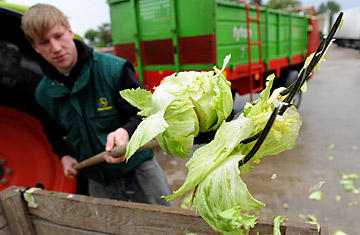
Farmer Tim Voges destroys lettuce in Ronneburg, Germany, on May 27, 2011, after fears of a deadly E. coli contamination spread throughout the country
Updates Appended: May 31, 2011
German authorities are urging consumers not to panic as an outbreak of a virulent strain of E. coli, known as EHEC, has killed at least 15 people, with no sign of abating. The bacterial outbreak — which was first reported on May 20 in northern Germany — is believed to have infected around 1,200 people, but officials fear it hasn't yet reached its peak. On Tuesday, Hamburg's state health minister, Cornelia Prüfer-Storcks, revealed that further tests carried out on Spanish-imported cucumbers showed they did not cause the current outbreak. Laboratory tests confirmed the presence of the EHEC bacteria but not the particular strain that was infecting patients in Hamburg. Two other tests are still being carried out by scientists.
German health-safety officials have advised consumers to steer clear of raw cucumbers, salad and tomatoes. And now the fear has spread to Russia, where authorities on Monday banned the import of all raw vegetables from Germany and Spain — and threatened to widen the ban to produce from the rest of the E.U.
The European Centre for Disease Prevention and Control in Stockholm has said in a statement that the outbreak in Germany is one of the biggest of its kind worldwide, and certainly the largest ever in Germany. Up to 500 cases of EHEC have been reported in the northern port city of Hamburg alone. With 30 people in critical condition, hospitals in the city have been struggling to cope.
"This is a very serious outbreak," says Thomas Alter, a food-safety expert at the Institute of Food Hygiene at Berlin's Free University. "In the past, there have been smaller EHEC outbreaks in Germany, which have been detected in beef or [unpasteurized] milk. But there's never been an EHEC outbreak linked to vegetables." Alter notes that Germany normally has an average of 900 cases of EHEC each year, but the new outbreak is "very dangerous." "The challenge now is to identify the source of the infection and determine how vegetables were contaminated by the EHEC bacterium, which is usually found in cattle," he says. The European Centre for Disease says that transmission of the EHEC infection usually occurs through contaminated food or water and through contact with animals, but person-to-person transmission is also possible.
On Monday, the outbreak claimed its 14th victim, a 75-year-old man living in the northern state of Schleswig-Holstein who, like the other fatalities, suffered from bloody diarrhea and kidney failure after developing hemolytic uremic syndrome, or HUS. Health officials say that while in the past HUS has mostly affected children, this time it is hitting adults, with women among the most vulnerable.
Amid growing concerns that the outbreak is spreading, some German supermarket chains have taken Spanish-imported cucumbers off the shelves and German consumers have started boycotting raw vegetables, even those from Germany. According to a survey published on Sunday in the newspaper Bild am Sonntag, 58% of Germans say they are not eating fresh cucumbers, raw tomatoes or salad. German farmers say they are now facing huge losses and are being forced to destroy crops because of the consumer boycott. However, despite pressure from Germany's powerful farming lobby, the government is still sticking to its guidelines. "As long as the experts in Germany and Spain have not been able to name the source of the agent without any doubt, the general warning for vegetables still holds," Agriculture and Consumer Protection Minister Ilse Aigner told Bild am Sonntag.
"My advice is simple: avoid salad, cucumbers and raw tomatoes, wash your hands carefully in the kitchen, and heat up all food properly," says Lothar Wieler, professor of microbiology at Berlin's Free University. "The high mortality rate and the spiraling number of cases of patients infected with EHEC who develop HUS are extremely worrying," he says, adding that the EHEC bacterium cannot be treated with antibiotics.
Other EHEC cases have been reported across Europe — in Britain, Denmark, France, the Netherlands and Sweden — but all of those cases involve either German nationals or patients who have recently traveled to Germany. European health officials say no case of a locally acquired infection has so far been detected outside Germany. Although Spain remains in the spotlight as being the suspected source of the outbreak — the Spanish authorities have taken water and soil samples from two cucumber farms in southern Spain — German officials have warned against jumping to conclusions. "We have found the EHEC pathogens in Spanish cucumbers, but that doesn't mean they are responsible for the whole outbreak," Andreas Hensel, president of Germany's Federal Institute for Risk Assessment, told the public broadcaster ZDF on Monday.
With no end to the outbreak in sight, German authorities are working around the clock to locate the source of the bacteria — and prevent it from claiming more lives.
The original version of this story has been updated to reflect new developments.
